
Sauerkraut is finely cut raw cabbage that has been fermented by various lactic acid bacteria. It has a long shelf life and a distinctive sour flavor, both of which result from the lactic acid formed when the bacteria ferment the sugars in the cabbage leaves.
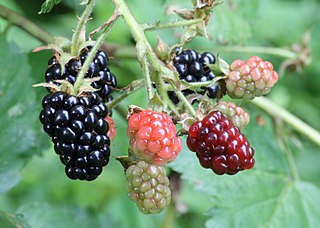
The Paleolithic diet, Paleo diet, caveman diet, or stone-age diet is a modern fad diet requiring the sole or predominant eating of foods presumed to have been available to humans during the Paleolithic era.
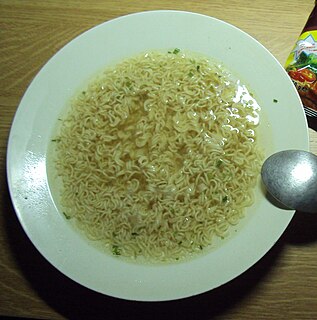
Convenience food, or tertiary processed food, is food that is commercially prepared to optimise ease of consumption. Such food is usually ready to eat without further preparation. It may also be easily portable, have a long shelf life, or offer a combination of such convenient traits. Although restaurant meals meet this definition, the term is seldom applied to them. Convenience foods include ready-to-eat dry products, frozen foods such as TV dinners, shelf-stable foods, prepared mixes such as cake mix, and snack foods.

A fad diet is a diet that is popular for a time, similar to fads in fashion, without being a standard dietary recommendation, and often promising unreasonably fast weight loss or nonsensical health improvements. There is no single definition of what is a fad diet, encompassing a variety of diets with different approaches and evidence bases, and thus different outcomes, advantages, and disadvantages, and it is ever-changing.
Raw feeding is the practice of feeding domestic dogs, cats and other animals a diet consisting primarily of uncooked meat, edible bones, and organs. The ingredients used to formulate raw diets can vary. Some pet owners choose to make home-made raw diets to feed their animals but commercial raw food diets are also available.

The Art of Cookery made Plain and Easy is a cookbook by Hannah Glasse (1708–1770) first published in 1747. It was a bestseller for a century after its first publication, dominating the English-speaking market and making Glasse one of the most famous cookbook authors of her time. The book ran through at least 40 editions, many of them were copied without explicit author consent. It was published in Dublin from 1748, and in America from 1805.

Adelle Davis was an American author and nutritionist, considered "the most famous nutritionist in the early to mid-20th century." She was as an advocate for improved health through better nutrition. She wrote an early textbook on nutrition in 1942, followed by four best-selling books for consumers which praised the value of natural foods and criticized the diet of the average American. Her books sold over 10 million copies and helped shape America's eating habits.
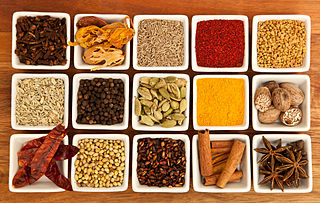
Maharashtrian or Marathicuisine is the cuisine of the Marathi people from the Indian state of Maharashtra. It has distinctive attributes, while sharing much with other Indian cuisines. Traditionally, Maharashtrians have considered their food to be more austere than others.
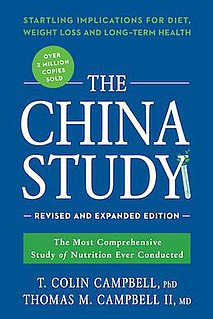
The China Study is a book by T. Colin Campbell and his son, Thomas M. Campbell II. It was first published in the United States in January 2005 and had sold over one million copies as of October 2013, making it one of America's best-selling books about nutrition.
The Montignac diet is a high-protein low-carbohydrate fad diet that was popular in the 1990s, mainly in Europe. It was invented by Frenchman Michel Montignac (1944–2010), an international executive for the pharmaceutical industry, who, like his father, was overweight in his youth. His method is aimed at people wishing to lose weight efficiently and lastingly, reduce risks of heart failure, and prevent diabetes.

Walter C. Willett, is an American physician and nutrition researcher. Currently, Willett is the Fredrick John Stare Professor of Epidemiology and Nutrition at the Harvard School of Public Health and was the chair of its department of nutrition from 1991 to 2017. He is also a professor of medicine at Harvard Medical School.

Brian Wansink is a former American professor and researcher who worked in consumer behavior and marketing research. He is the former executive director of the USDA's Center for Nutrition Policy and Promotion (CNPP) (2007–2009) and held the John S. Dyson Endowed Chair in the Applied Economics and Management Department at Cornell University, where he directed the Cornell Food and Brand Lab.
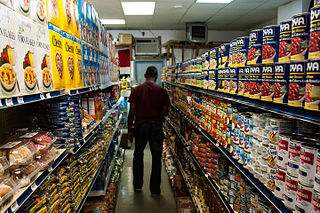
A food desert is an area that has limited access to affordable and nutritious food, in contrast with an area with higher access to supermarkets or vegetable shops with fresh foods, which is called a food oasis. The designation considers the type and quality of food available to the population, in addition to the accessibility of the food through the size and proximity of the food stores.
The Dietary Guidelines for Americans (DGA) provide nutritional advice for Americans older than 2 years. The Guidelines are published every 5 years by the US Department of Agriculture, together with the US Department of Health and Human Services.

Fit for Life (FFL) is a diet and lifestyle book series stemming from the principles of orthopathy. It is promoted mainly by the American writers Harvey and Marilyn Diamond. The Fit for Life book series describes a fad diet which specifies eating only fruit in the morning, eating predominantly "live" and "high-water-content" food, and if eating animal protein to avoid combining it with complex carbohydrates.

Laurel's Kitchen is a vegetarian cookbook, first published in 1976, that contributed to the increasing awareness of vegetarian eating in the US. Its authors were Laurel Robertson, Carol Flinders, and Bronwen Godfrey, and its subtitle was a handbook for vegetarian cookery & nutrition. A second edition, The New Laurel's Kitchen, was published in 1986. It had the same subtitle and the same first two authors, and Brian Ruppenthal was the new third author. The book has sold over a million copies. The same authors have published related Laurel's Kitchen books on breadmaking and caregiving.

Michael Herschel Greger is an American physician, author, and professional speaker on public health issues, best known for his advocacy of a whole-food, plant-based diet, and his opposition to animal-derived food products.

The Philosophy of Eating is a book on nutrition by American homeopathic physician Albert J. Bellows (1804-1869). The book was first published in 1867 with the posthumous edition descriptor line Late Professor of Chemistry, Physiology, and Hygiene, and reprinted in later years to the current Philosophy of Eating. Entered, according to Act of Congress, in the year 1867, by Bellows, in the Clerk's Office of the District Court of the District Massachusetts stereotyped at the Boston Stereotype Foundry.

Ten Talents is a vegetarian and vegan cookbook originally published in 1968 by Rosalie Hurd and Frank J. Hurd. At the time, it was one of the few resources for vegetarian and vegan cooks. The cookbook promotes Christian vegetarianism and a Bible-based diet, in keeping with teachings of the Seventh-day Adventist Church. By 1991, the 750-recipe cookbook was entering its 44th printing and had sold more than 250,000 copies. An expanded edition with more than 1,000 recipes was issued in 2012.

Carlson Wade (1928-1993) was an American alternative health writer who authored many books promoting detoxification, fasting, juicing, natural foods and raw food dieting. He developed a fad diet known as the Enzyme-Catalyst Diet.
















